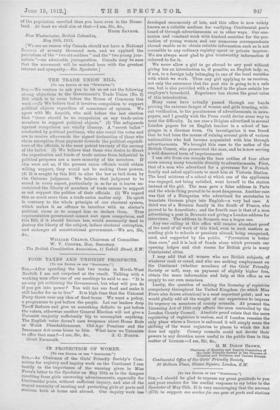IN PROTECTION OF WOMEN.
[To THE Burros or THE " SPECTATOR."] SIR,—As Chairman of the Girls' Friendly Society's Com- mittee for registry and inquiry work on the Continent I can testify to the importance of the warning given in Miss Frero's letter to the Spectator on May 25th as to the dangers resulting from girls answering advertisements, especially for Continental posts, without sufficient inquiry, and also of the urgent necessity of meeting and protecting girls at ports and stations both at home and abroad. Our inquiry work has developed enormously of late, and this office is now widely known as a reliable medium for verifying Continental posts heard of through advertisements or in other ways. Our con- nexion and constant work with kindred societies for the pro- tection of young women and our numerous correspondents abroad enable us to obtain reliable information such as is not accessible to any ordinary registry agent or private inquirer. We are always most glad to give trustworthy information if referred to for it.
We never allow a girl to go abroad to any post without
giving her an introduction to, if possible, an English lady, or, if not, to a foreign lady belonging to one of the local societies with which we work. Thus any girl applying to us receives, not only the assurance that the post she is going to is a safe one, but is also provided with a friend in the place outside her employer's household. Experience has shown the great value of this introduction.
Many cases have actually passed through our hands proving the extreme danger of women and girls trusting, with- out verification, to the genuineness of advertisements in news- papers, and I greatly wish the Press could devise some way to meet the difficulty. In one case a Belgian advertised in several London papers for an English teacher in a school of lan- guages in a German town. On investigation it was found that he had been the means of ruining several girls of various nationalities who had become acquainted with him through advertisements. We brought this case to the notice of the British Consul, who prosecuted the man, and he is now serving a well-deserved term of imprisonment.
I can cite from our records the bare outline of four other cases among many traceable directly to advertisements. First, that of a man who advertised for a governess for a French family and asked applicants to meet him at Victoria Station. The head mistress of a school at which one of the applicants was engaged, not being satisfied, went herself to the station instead of the girl. The man gave a false address in Paris and the whole thing proved to be most dangerous. Another case was that of a Hungarian who advertised for secretaries to translate German plays into English—a very bad case. A third was of a Russian family in the South of France, who proved to be Anarchists ; and the fourth case is that of a man advertising a post in Brussels and giving a London address for interviews. The address in Brussels was a bogus one.
Any one calling at this office will receive abundant proof of the need of all work of this kind, even in such matters as sending girls to schools or pensions abroad, being recognized, used, and supported by the public. "Prevention is better than cure," and it is lack of funds alone which prevents our opening lodges and club rooms for British girls in many Continental cities.
I may add that all women who are British subjects, of whatever rank or creed, and who are seeking employment on the Continent (whether members of the Girls' Friendly Society or not), may, on payment of slightly higher fees, obtain the same information and help at this office as we supply to our own members.
Lastly, the question of making the licensing of registries compulsory throughout the United Kingdom (to which Miss Frere also draws attention) is a most important point; and we would gladly add all the weight of our experience to impress its urgency on members of county councils. At present the Licensing Act of 1910 only affects the area controlled by the London County Council. Absolute proof exists that the mere registering of registries is useless, and if London remains the only place where a licence is enforced it will simply mean the shifting of the worst registries to places to which the Act does not apply. County councils could not devote their powers in any direction more useful to the public than in this matter of licences.—I am, Sir, &c., G. M. Dtxon BROWN, Chairman of Registry and Inquiry Committee of the Girls' Friendly Society in the Dioceses of Gibraltar and Northern and Central Europa. Continental Office of the Girls' Friendly Society, 10 Holbein Place, Sloane Square, London, S.W.










































 Previous page
Previous page